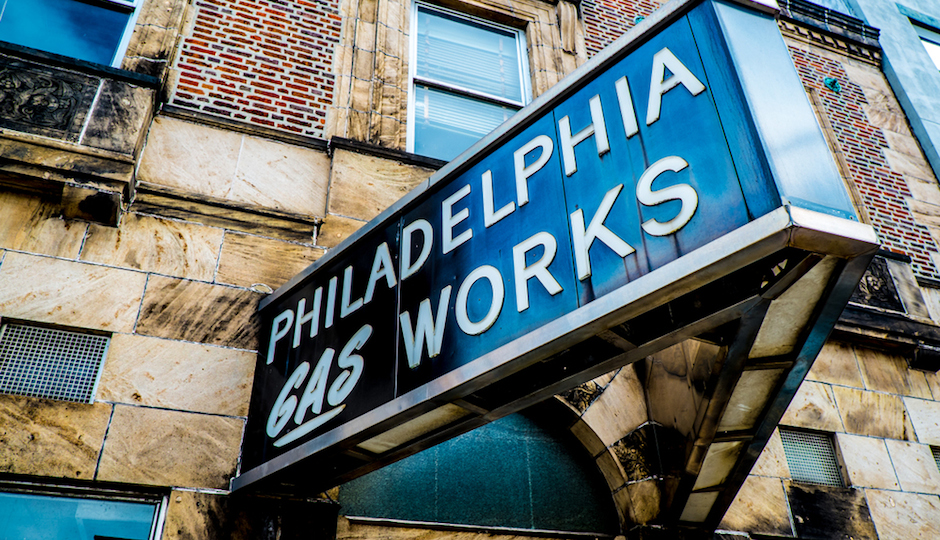Philly (Still) Has A Lot of Leaky Aging Gas Pipes

Photo | Jeff Fusco
Philadelphia has a lot of old natural gas pipes running under the city, and a lot of them are leaky, according to a new newspaper report. What’s not in the report? The city has a solution at the standby — but nobody’s really talking about it.
The Pittsburgh Tribune-Review reports:
Pipes made of cast iron and bare, unprotected steel make up less than 6 percent of the natural gas distribution network in the United States. Yet those pipes account for 95 percent of leaks, the state Public Utility Commission said.
The highest concentration of risky pipe in Pennsylvania is under its most populous city. Cast iron makes up half of Philadelphia’s 3,000 miles of pipeline, the Trib found. Philadelphia Gas Works reported the highest rate of leaks in the state in 2013 with 89 per hundred miles of mains — eight times the national average.
Utilities stopped using cast iron and unprotected steel by the end of the 1960s, and federal regulators urged them to replace it starting in the 1970s.
Forty years later, more than 10,000 miles of such pipe remains under Pennsylvania, federal data show. The PUC estimates it would cost $11 billion — about what the state spends on education this year — to replace.
There’s not much new here actually — the New York Times offered a similar report earlier this year, though it pegged the city’s gas leaks at 76 per 100 miles of pipe. If the number has ticked up that quickly, it should be cause for alarm.
The Pittsburgh report features Gov. Tom Corbett throwing his hands up in despair at the prospect of making fixes: “Should we replace it? Yes. But how do we pay for all of that?” he told the Trib.
But there actually is a solution, and it’s practically sitting in our lap: Sell PGW.
The debate about selling PGW to UIL Holdings, a private Connecticut company, has focused on a number of issues — some more worthy than others: The personality differences between Mayor Nutter and Council President Darrell Clarke; union jobs; future heating costs for the poor. What’s been little-discussed is this: UIL has promised to replace the city’s aging, super-leaky gas infrastructure at a much quicker rate than if PGW stays in the city’s hands.
Remember: In March, StateImpact reported that replacing those gas mains would take the city 70 years if it continues at its current rate of 25 miles per year. UIL says it can finish the job in half the time. In April, UIL’s Michael West elaborated on that scenario in an interview with me:
I think what you’re going to find, you know we expect to accelerate the investment. The current plan is for [it to take] 88 years to replace the [city’s] 1,500 miles of cast iron pipe. We plan to do it in half the time. So what you’ll see as a customer is increased investment, fast-paced, if you will, changing of the infrastructure to the newer technology that exists today. And doing it, by the way, at a cost that’s not as impactful to you day one as it is today with PGW.
He added:
An example I gave is in the current scenario, the easiest way to sum it … people have used a mortgage example, but I sum it in three words: Debit or credit. If you ever try to rent a car on a debit card, you gotta have the money ready, available, for them to even allow you to take the car. PGW operates on a cash basis. It’s like a debit card. We have a credit card. And our credit is such because we’ve proven to the business community and investment community that we can make these investments and get the return on that. So is there a percentage we pay just like you pay on your credit card? Sure, but we can do a lot more a lot faster and now have the same impact on customer rates as it would if you were doing it under the same PGW structure.
Just to be sure, I pressed: Was this a commitment or merely a statement of capability? The former, he said. “So the intent is to make the investment, it’s not sort of a general theme. ” The company has also pitched an enhanced pipeline replacement program as job security for union workers, in an attempt to secure their support on the project.
OK then. There are lots of issues at play in the PGW sale. But if you’re simply worried about the city exploding beneath your feet, you might want to go ahead and root for UIL.


